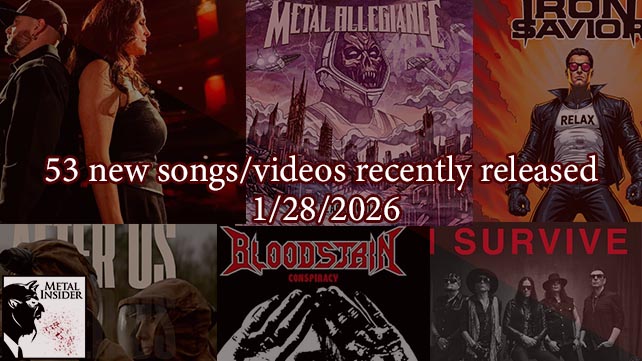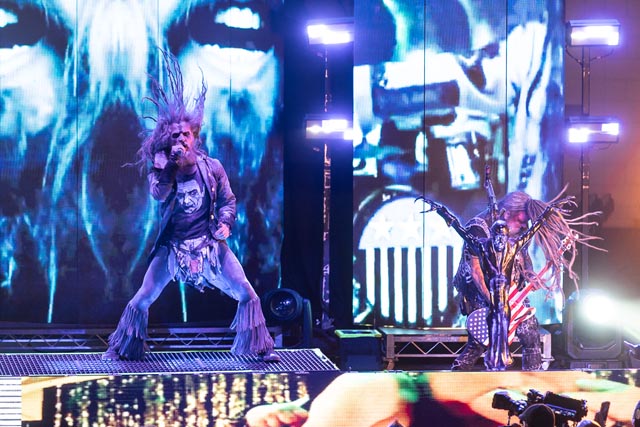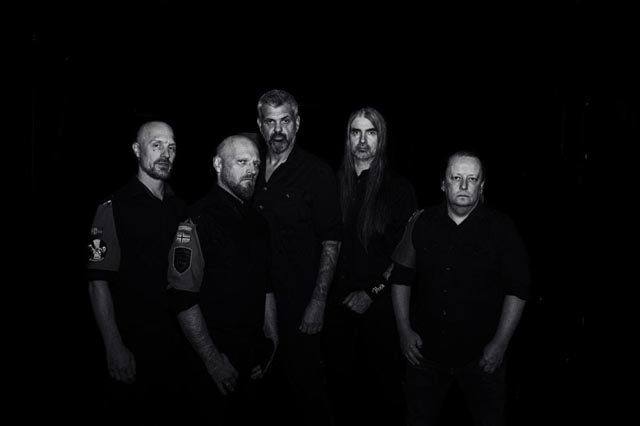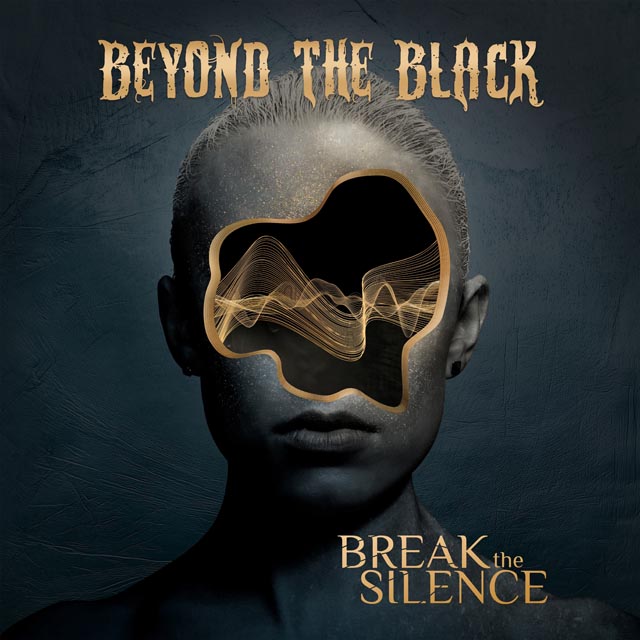Jay Ruston is a busy man. After his second consecutive year being nominated for a Grammy (both for Anthrax), the producer and engineer has two albums coming out on April 1st that he had a hand in. Ronnie James Dio: This is Your Life, which Ruston was involved with four tracks of, will be released that day, as will All You Can Eat, the third album from Steel Panther. We caught up with Ruston to talk about working with some of metal’s elite, as well as what every band should know before they go into a studio.
How does it feel to have been nominated for a Grammy?
I was excited for the past two years, for Anthrax, that bands like that get recognized. I don’t pay too much attention to the Grammys, I’m not a voter. They’ve missed the mark so often, at least in rock and metal. It’s not really our world, they don’t get it. At the same time if you win, it can be good in many different ways, it introduces the band to an audience that might not know it. It helps sell records; people still buy records and that definitely helps.
Did you watch them?
No. everybody that goes always says how painful it is, it’s so long, its four hours long, there’s so much music that I don’t care to watch or listen to. I love all styles of music, but they don’t represent those styles of music. It’s the same people all the time, every 3-4 years. Whoever is being promoted the heaviest is always on the Grammys, and it just doesn’t interest me.”
Is there a reason why you are not a member of the Academy?
Not particularly, I haven’t thought about it. A couple other producers and my mastering guy all vote but even they’re like, ‘look they basically take your money every year and you hope that you’re one vote counts for something in the music area that you care about and then you get the nomination list and you’re like oh wow what is this? Why is this band in that category?’ I can see their frustration as well, it just doesn’t matter.”
How did you get involved with the Dio tribute?
Possibly even more than a year ago, Wendy Dio mentioned to me that it was going to happen, and at that point they already had Metallica involved. They were basically the first band to be involved. She mentioned to me about having Anthrax and I said, ‘yeah absolutely,’ and we were in the middle of recording some cover songs for the Anthems EP. We decided to do “Neon Nights,” which is amazing because that’s my favorite Dio-era Sabbath song, one of my favorite Dio songs ever. So it was really exciting to do that song because we love it so much and the band did an amazing job. It’s the opening track for the record, and I think it’s very fitting as well. That just kind of bloomed from there I helped her get Corey Taylor involved. Unbelievably, “Rainbow in the Dark” was still available and I suggested that one and we looked at some clips of how they would do it live. Later on, they would do that song a with bit lower tuning and it’s pretty heavy and cool, definitely one of my favorites on the whole tribute record.”
So were you just involved in those two tracks?
I am actually involved in four, those two the most because I was involved with some of the recording and mixing. Then I mixed the Adrenaline Mob song as well, which had already been released on their Coverta EP. We had mixed it as a B-side on their first record and then they ended up putting it out. Oni Logan did a track with Jimmy Bain and Jeff Pilson, and Roy Robinson, and Brian Tichy , and they asked me to mix that too, so I ended up mixing another two, so four songs in total actually.
So your fingerprints were pretty much all over the album?
Yeah it’s awesome, I’m totally stoked, and I think some of the best songs he ever did too. Having “Neon Nights” and “Rainbow in the Dark,” my two favorite Dio songs that I got to participate in, was really amazing.
What did Dio mean to you?
I discovered Dio really early, at least for me growing up in music, early 80’s, starting to get into rock and metal. One of my school friends’ older brother had a couple Dio cassettes. We would take them and listen to it and I remember hearing “Holy Diver” for the first time and just being like ‘Wow what is this?’ At that time I was pretty young I don’t think I even knew he had been in Black Sabbath or Rainbow or any of that. That discovery as a kid comes later, and just his voice, that guitar, everything about it, something spoke to me with his music and I loved him ever since. I have every record and I’m lucky to be involved with this and to call Wendy a friend is just amazing.
Lets move onto Steel Panther. Have you worked on all three of their albums?
Yeah I’ve produced all three. This one we started in December 2012. The band started sending me demos and songs and they’re very prolific, they’ll write 25 songs in a matter of weeks or months, and then narrow that down to the best 10 or 12. Then we started pre-production, getting serious in January-March 2013, and pretty much did all the recording between April and May of last year. The whole thing was mixed and mastered by the end of last summer. We’ve been sitting on this one for a while. It’s hard when you finish a record at the end of the summer. Do you try to put it out, or do you wait until next year? Obviously the label decided to wait and that’s fine, it’s just frustrating when you’re sitting on something that you’ve done for months. But I’m excited and it’s coming out the same day as the Dio tribute, which is pretty funny.
April Fool’s Day is a big day for you!
Yeah, and we got Satchel on Rainbow in the Dark, he came and played the guitar solo. Corey asked him to do it and of course he did. He didn’t play Vivian’s solo, he wrote a new solo and it’s still awesome. That was fun; he played the keyboard parts on guitar too. Christian Martucci did all the rhythm bits and he did a great job. He’s playing with Stone Sour now – and then Satchel came in and did all the extra stuff.
How is their new album different from their last few?
I think there’s some heavier moments for sure, especially the opening track, which is my favorite song on the whole record, called “Pussy Whipped.” It’s obviously got the humor factor but it’s a really awesome hard rock tune with a lot of cool musical elements. It’s sort of all over the place, really uptempo, and there is a lot of that on the record. The drummer got into a lot more double kick stuff. Their musicianship is just amazing. I think we did the music for the whole record in six days; they’re so fast and so good at what they do. As usual it’s the lyrics and the vocals that we spend the time on making that as funny as possible, and performance wise. Michael Starr can sing that whole record in a couple days too, but that’s not the point, the point is it has to be funny, there’s so much more to it than just singing.
Is this record self-released?
They’re on a new label called Open E, but I’m not exactly sure how it works. I know they’re distributed through a major distributor. They’ve always been in control with what they do, even when we were on Universal, there wasn’t really too much guidance from the label. They made a couple topic suggestions on the second record which we tried to address, at least singing about something other than girls. Those guys have always drawn their own path and that’s just what they do.
They launched a crowd funding campaign for the album. Any personal feelings on the whole crowd funding thing?
I generally view crowd funding as a positive thing it depends who’s doing it and for what reason. I’ve seen people, certainly in the movie and TV area, which have no business doing it. Only because they don’t want to take a risk and come out of pocket, I understand that but if you really believe in your project and believe in it enough to ask other people for money, I think they should believe or invest in yourself which what we constantly do in music.
Like Zach Braff crowd funding the garden state sequel?
Yeah that’s a good example; I know he took a lot of flak for that. To me, a guy like that can easily garner some funding without having to go to the general public. I don’t know enough about it though. Certainly for bands that were successful and in a major label and now find themselves now in that in that position, but still have a quality product to offer and still want to go out on the road but don’t have that machine behind them. What else are you going to do? If people aren’t buying records and there’s no money coming in, then you can’t make a record. It still costs money to make a great record, that’s never going to change. Even if you own your own studio which so many people do, there’s still inherent costs and you still have to pay people to get it done so I didn’t see a problem with it in that area. A lot of bands put it out there and the whole thing funds really quickly. A band I did a lot of mixing for, Bowling for Soup did one, they did very well and their fans came though and that’s cool.
What are you working on right now?
A bunch of different stuff, I’m doing a record which I’m really excited about that I’ve bwen working on for quite a while with Pearl Aday. It’s a bit of a change from her last album which was definitely more of a rock thing were calling this one California country, sort of like what the Eagles did, and that’s the vibe. We brought in some incredible musicians from all different walks of life and played with amazing people. Her core band on the record, is her and Jim Wilson write the songs, Jim plays guitar, they both sings, Joey Vera plays bass. He’s just fantastic; the only guidance I ever gave him was John Paul Jones He wrote these amazing beautiful bass lines, on drums Ryan Macmillan who’s played with Matchbox 20. So he’s coming from kind of a pop world and Scott Ian, her husband plays guitar as well. We brought in Fred Mandel to play keyboard, he’s an unbelievable legend, and he actually played the B3 solo in Anthrax’s cover of “Smokin.'” He’s incredible. He used to play guitar and keyboard with Alice Cooper in the late 70’s, and then he joined Queen as their live keyboard guy. He was in Supertramp and played with Elton John. We had him come in and do a ton of keyboard and Fender Rhodes and all that stuff. We had a Great pedal steel player JayDee Maness who is a legend. It’s been a really fun record to make and were just taking our time getting it right and discovering really. We’ve been in pre-production and song writing with Anthrax for the last 4 months and that will continue for at least another month or two. We’re not on a tight schedule. When they’re ready, they are ready, we would like to start recording in the spring but it all comes down to if the songs are ready and we feel we are ready. We’re getting there. They’ve already written 12-13 songs sand they’re all great. I’m very excited about that.
I’m also currently working with a cool band from Sweden called Avatar. They just made a new and they sent me the mix; some of the coolest riffs. When they sent me the new material I was just blown away, everything about it, they’re great musicians. Sweden, the musicians they churn out just blows me away all the time, just killer riffs, original sounding guitar playing, great singing, and a fantastic rhythm section. I’m excited to be mixing that, it’s something different for me; it’s been a lot of fun. Having listened to their previous record what I’m mixing now is a major step forward and they’re going to take a lot of notice once this record comes out.
How would you describe Anthrax album so far from the songs you’ve heard?
It’s just a continuation for the greatness of Worship Music. I walked into that record when it was half done it was a bit different for me. The songs were there, they just needed to get vocals finished up, some guitar, and mix it. This time being there from the beginning and watching their process and the music come together have been really exciting. The riffs are killer, the energy; the aggressiveness of it is on par or heavier than the last record. They’re a thrash band and we don’t want to lose that.
What do you look for in bands pitching to work with you?
I get a lot more mixing pitches than producing, because a lot of bands can’t afford a producer. Unsigned or newly signed bands make their own records and come to me for mixing. Even mixing, I treat like a producing job where I like to hear the material first; because honestly I might not be the right guy for it. I’ve test mixed for a lot of bands and it ended up not working out for whatever reason. It really comes down to the songs; I want to mix and produce great songs. I’m careful with who I choose to work with. I want to have fun doing it, if something isn’t good, and you’re having to force it, why do it? It has to be something you love doing.
What artists have you learned the most from that you’ve worked with?
I learn stuff every record, from the brand new people that have never done anything, to the veterans. To me one of the most important things is how people get along. That sort of democracy of being in bands, that’s probably the most valuable thing ever. If you can keep the creative process happening with everyone feeling good about it, then you get the best out of everybody because then they all feel good about what they’ve contributed. I’ve been in situations where one person is doing everything and that’s either okay or not okay with everyone else. It depends, if there’s that sort of dictator situation in a band which a lot of bands have, that sometimes works and sometimes doesn’t. Every situation and every band is so different, if you can keep that creative flow where every person in the band has their place and has something to offer whether they’re writing the songs or not. Being able to figure out what that is from each person is what I try and do really.
Eyal Levi told us that he’s learned a lot from talking to you.
Yeah, we have great chats, I love talking to him. he’s in a different world than me. I’m constantly emailing and texting him about different technical things or plugins or products and Mark Lewis too. Those guys are super cool and they do amazing work, and that’s what I love about working in metal. There’s a community of people between the musicians, producers, engineers, managers, everybody involved, and I’m friends with everybody in all these bands. Having worked in the pop and country world it’s there, but it’s not the same, it’s hard to describe. The country club as they call it, in Nashville, they have it but it’s a different scene. The metal club is worldwide, it doesn’t matter where you go, whether it’s in Europe, America, or Canada, if you work in that club, you know somebody there and it’s great I really love it.
Any bands that no longer exist that you wish you could have worked with?
Tons, I would have loved to work with Ronnie James Dio. I understand his music so well, that would have been amazing. There are bands that still exist too. Soundgarden, I’ve always loved and would love a chance to work with them. There is so much music out there that I love, the obvious ones that everyone will always mention like Led Zeppelin. To me I’m just a fan of music, if I get a chance to work with somebody that I’m a fan of like Anthrax, who I’ve loved since the 80’s, then I’m eternally grateful for that kind of opportunity.
Other than communicating and getting along with each other, what advice do you have for recording musicians?
So many people rely on the computer and that’s a huge mistake, and I think the listener hears that. There are so many new metal bands that the drums are programmed and everything is replaced with samples, it sucks the life out of it. The thing that’s great about metal is there are always great musicians. Let it be real, and showcase that. Practice is what counts. Anybody that played an instrument knows that you have to practice for hours and hours to get good at what you’re doing. Recording is the same way, especially with younger bands. Get into a cheap studio, go practice recording, get good at recording, it’s a whole different art form. I’ve found that with some of these younger bands that I’ve worked with; their go to is to “cut and paste that, every chorus is the same.” No I’m not just going to cut and paste for every band for every chorus, like that’s just pure laziness just play your fucking song. To me it makes such a big difference.
When I do meet a younger band that wants to make a record with me the first thing I say to them is to write all the songs, go into pre-production mode, make sure all the arrangements are good in a rehearsal room, and then rehearse for 2 weeks so you can play your record inside and out like you’ve been playing your old songs at you live shows. If you can do that when you get into the actual studio and record for real, it makes such a difference and I don’t mean in the speed and saving money portion, which is helpful, but I mean the feel, the vibe, and the energy will come across, especially if you’re recording to tape or whatever. If you can play those songs like you’ve played your old songs everyone can tell. I try and do that with every band that I’m producing. It’s not always possible financially, or people don’t always live in the same city, but if you can make it happen on some level, and I did it with Steel Panther, I’m doing it with Anthrax, after the songs are written we sit there and jam, I record every jam, listen back to those, email each other and make comments and change things. The next time we get together, we do it again. By the time we hit the studio were going to be kicking ass. It’s about getting great performances. Its hard work but people just get so lazy with Pro Tools.
[photo taken by Neil Zlozower]










